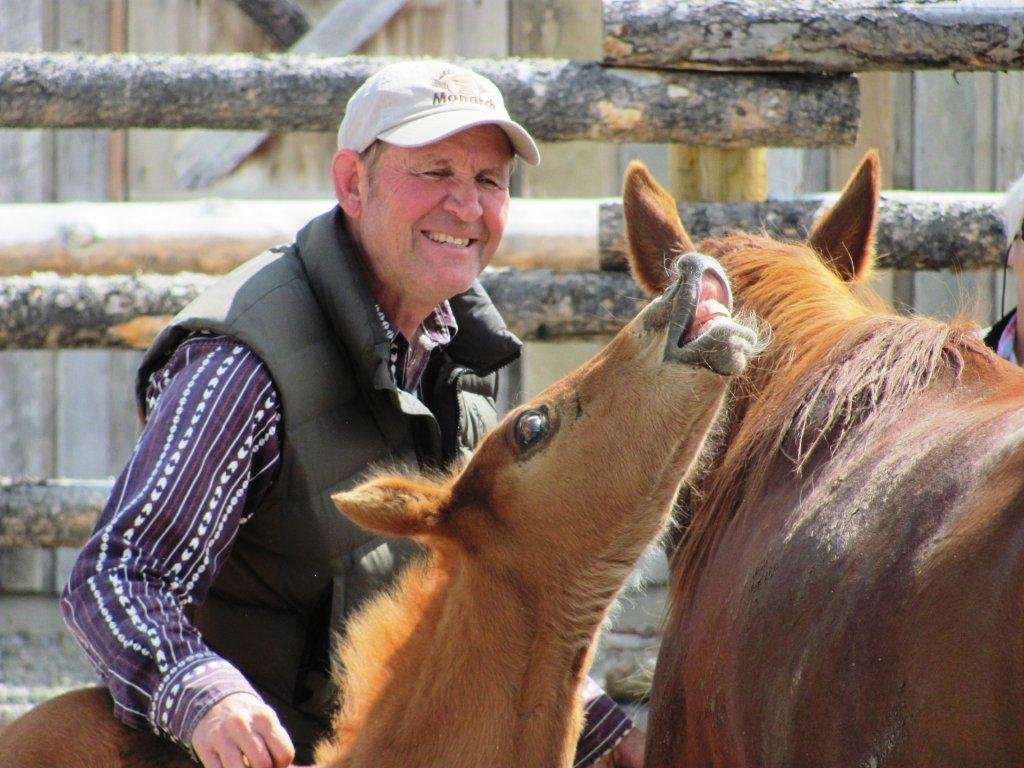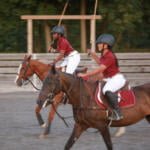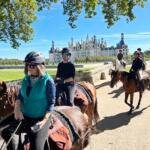Maury “Jonesy” Jones has lived and worked with horses his whole life on mountain trails in the “school of hard knocks.” When his favorite horse, Shadow, developed arthritis, Jonesy contemplated how to make his faithful companion’s retirement years comfortable. He created a horse rescue and “old folks’ home” where senior and injured horses could retire on an idyllic ranch at the foot of the Grand Tetons.
Jonesy and his wife, Linda, spoke with BRU about what it’s like to run a nonprofit horse rescue and how it’s changed their lives.
This interview has been edited for length and clarity.
BRU: Tell me a little bit about your background with horses.
MJ: I rode horses as a child on the farm, and from the time I was 13, in 1961, I’ve been heavily involved in horses. My dad went to work for his cousin who owned a kids’ summer camp in Colorado, and we had 30 horses at the camp all summer.
I eventually bought that ranch and had it until I moved to Wyoming in 1978 to run my outfitting business, guiding summer trail rides and hunting trips up into the mountains.
BRU: What role did Shadow play in your life and your business?
MJ: He came to the ranch when he was just a little, scrawny yearling. After three years in pasture, I started working with him, and he became my favorite horse. We traveled some of the roughest country in the world together, literally thousands of miles, for 18 years.
One day, he had to step over a log, and he kind of drug his left hind foot over it. I knew something was wrong. The vet said he had arthritis. Horses—like people—can get arthritis young or old.
I wondered what to do. He was an old friend with a lot of life left, but horses are expensive to feed. That inspired my wife, Colleen, and I to start our “old folks’ home” for horses and apply for a 501(c)(3).
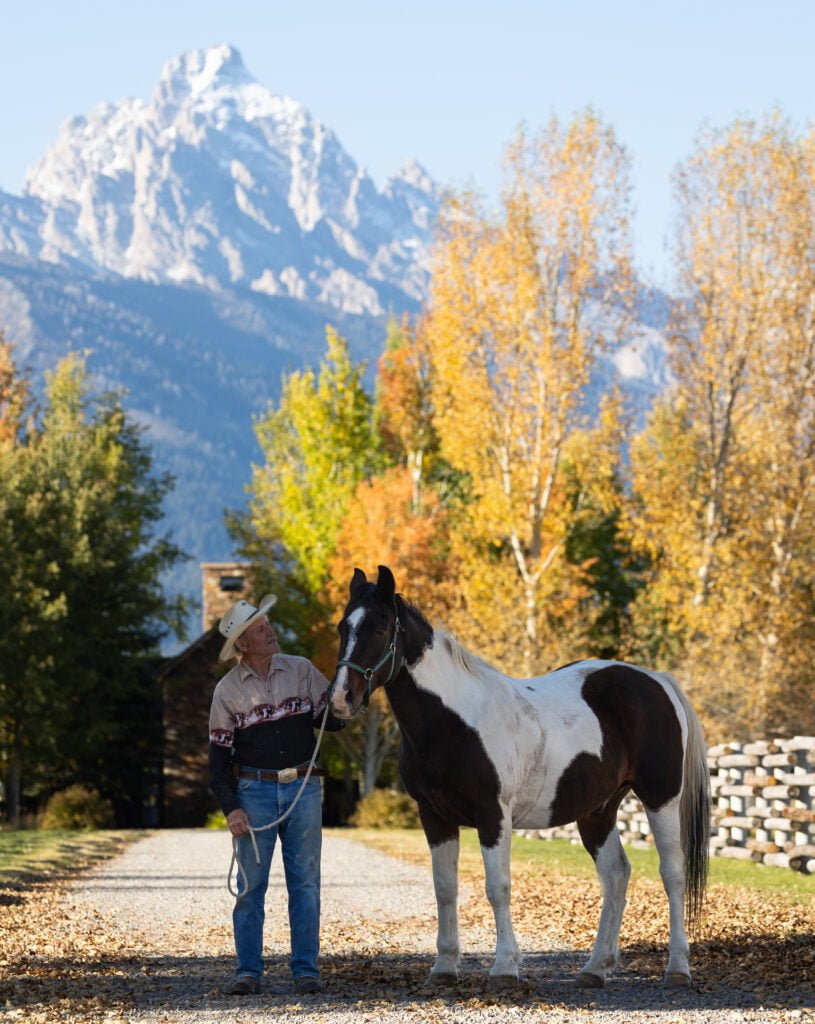
BRU: Did you take in your first rescue horses soon after?
MJ: Yes. The first phone call we got, the guy said, “I’m out of hay. I’m out of a job. I’m out of money. Could you come get my two horses? I’ve tried to sell them, and I can’t.” We took them in, and that’s how we started.
BRU: Have you found that the rising cost of hay has forced more people to make hard decisions like that?
MJ: Yes, it’s pricing people out of being able to keep a horse. Just this morning, Linda and I talked to a lady with a 28-year-old mare she just can’t afford to feed anymore. We agreed to take that horse in, and we’re going through the process of getting her here.
BRU: Do all of the horses stay in your care? Or do you rehome them?
MJ: We do rehome them when we can. Sometimes people who only want a pasture pet will adopt a horse. Most of the horses we get are either old or have a health issue such as lameness, and many people don’t want a horse with health issues, so we doctor them and retire them here.
BRU: What sort of issues have you had to help surrendered horses with? Are there many surprises or bad experiences?
MJ: Usually, people are pretty honest about what they’ve got, but there are some surprises. We do our best to screen horses when they arrive and give them the best care and supplements we can.
We’ve had a couple with difficult behavioral issues, but most of them are pretty good. Some of them have injuries that just need time to heal, and then they can live comfortably again.
It’s hard when they’re struggling. We had one come in that was really skinny, and we hoped it would only need better feed, but it had cancer all the way through, so we had to put it down. That was sad.
We’ve taken in abandoned and neglected horses as well, including three whose owner died, and they got left all alone on his property with no care. Luckily, neighbors eventually realized and helped us bring them in.
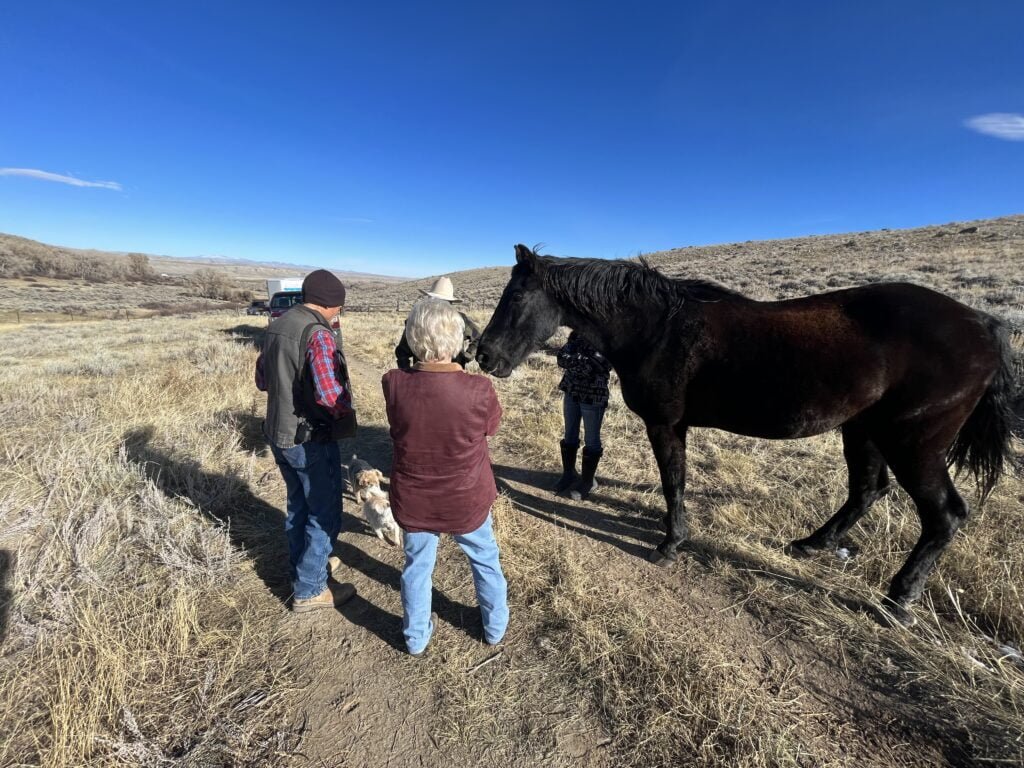
BRU: How are you able to cover the costs of caring for senior horses?
MJ: We took a lot of money out of our pockets initially to support the rescue, and it was a struggle. It took some time to figure things out.
Now, the pasture we keep them on is free. I got hired in 2011 to manage the 260-acre ranch where we’re currently located. The boss and I cut a deal that he would provide 40 acres of irrigated pasture for the horse rescue if I would take his guests horseback riding. We take rides on some of the easy trails in Grand Teton National Park.
So, it’s a win-win. The horses who are fit enough to go for short, two-hour rides help earn their keep that way. It’s an easy life for them, and it’s beautiful scenery and a great life for us too.
LJ: It’s a gorgeous place for horses to come and relax and get healthy, just running free in the pasture. It’s ideal.
MJ: Also, Jackson holds a fun event called Old Bill’s Fun Run every year specifically to help charitable organizations with their funding. There are booths where charitable organizations can tell people about their causes.
We struggled financially for five or six years before we got involved. It’s grown a lot since we started participating, and it’s a really helpful source of funding.
We also advertise in the newspaper, through email, and by mail asking for donations for the horses, and people are really good about donating. However, making sure we have enough space and resources will always be an ongoing thing.
We have to turn down a lot of horses every year because we don’t have enough facilities. We need another pasture in the summer to keep some horses in and more capacity in the winter. Linda has been working lately to contact charitable foundations that will donate so we can either buy or lease land for that.
BRU: What’s a typical day like, and who else helps out?
MJ: We have six people on the board of directors. I’m the CEO. Linda is my right hand. She’s in charge of development and grant writing. I spend time on the computer answering emails, contacting people, and doing bookwork.
We’re the only two full-time workers, but we don’t receive any pay. This is strictly a non-paid, all-volunteer outfit. We have volunteers who come for an hour or two here and there to help us fix things, brush horses, and clean poop out of the corral. Things like that really help out.
LM: I’ve been spending an awful lot of time putting together packages and sending them out to different types of funders. Now, my next job is to follow up to see if they’ll be a good fit for what we want as an organization. And it’s hard to find funding. It takes a lot of research.
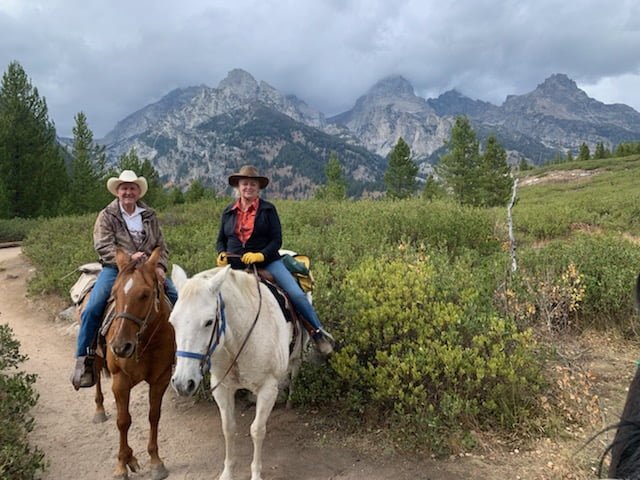
BRU: What do you feel are the highlights of running a horse rescue?
MJ: Hugging on the horses (laughs). We love taking guests on a ride. When we don’t have guests here, and we have half a day available, we’ll take a ride ourselves.
Doctoring horses is work, but it’s very satisfying to see the horse get a little bit better over time. And even with our healthier horses, problems crop up. It’s time-consuming and difficult, but it’s a very rewarding thing.
One horse we took in, Shai, was really skinny, and then four months later she was just beautiful and sleek. That’s wonderful when we can take in a horse that’s been malnourished and it becomes fat and sassy.
BRU: Do you feel it’s gratifying to be able to give these horses a place in their older years?
MJ: Oh, it really is. You find out quick that horses have personalities just like people do. Some horses are kind of standoffish, and others are like a puppy dog: “Give me attention,” “Give me a hug.”
We have old horses, so some of them die each year, and that’s always hard. We have to be mindful of their chronic pain and make difficult decisions, and we work closely with our vet on that.
It’s sad sometimes, but mostly really happy and special to provide this place for them. It’s busy, but we get to work with horses.
LJ: We’re living the dream!
To donate to the horse rescue or learn more about Jonesy and Linda, please visit the Jackson Hole Horse Rescue website or follow their Facebook page.
You can view more BRU interviews here. If you’d like to nominate someone for an interview, please contact us!

